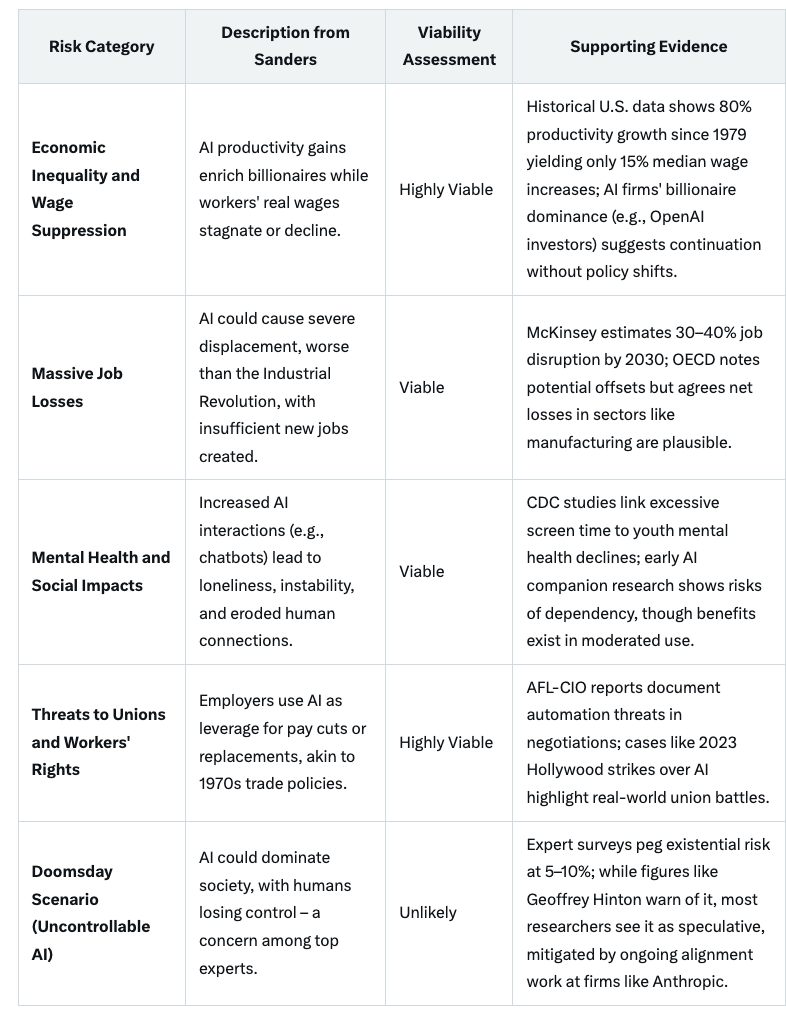Bernie Sanders Warns of AI's Dangers: From Job Losses to Doomsday Scenarios – But Not All Risks Are Created Equal
Vermont's independent U.S. Senator Bernie Sanders has once again positioned himself as a vocal critic of unchecked technological advancement, warning in a recent Gizmodo interview that artificial intelligence could deepen economic divides, erode workers' rights, and even pose existential threats to humanity.
Published on July 13, 2025, the conversation underscores Sanders' ongoing advocacy for policies that prioritize ordinary Vermonters and Americans over corporate elites, while drawing on his discussions with leading AI experts to frame the technology as a double-edged sword.In the interview, conducted by Gizmodo's Luc Olinga, Sanders emphasized that AI is "neither good nor bad" but depends on who controls its benefits.
Sanders Says Billionaires Win Again
He argued that without systemic changes, productivity gains from AI would flow disproportionately to billionaires and CEOs, leaving workers with stagnant or declining wages – a pattern he traced back over the past 50 years of technological progress. "Almost all the benefits of that productivity have gone to the corporations and to the companies that developed that technology," Sanders told Gizmodo, attributing the claim to inflation-adjusted wage data that shows many workers earning less in real terms today despite soaring output.
Sanders' familiarity with AI stems from his policy-focused engagement rather than hands-on technical expertise. As a senator serving on committees like Budget and Health, Education, Labor, and Pensions, he has consistently addressed technology's societal impacts. Recent statements reveal a pattern: In a June 16, 2025, post on X, Sanders called for a shorter workweek amid the "explosion of AI," insisting benefits must go to working families, not "high-tech CEOs."
Earlier, in March and April 2025 X posts, he criticized figures like Elon Musk for arbitrary firings, warning that AI could similarly displace private-sector workers without safeguards.
News reports from outlets like TechCrunch and Futurism in June 2025 highlighted Sanders' push for a four-day workweek, arguing AI-driven productivity should yield more leisure time for activities like family or hobbies, not just corporate profits.
Does Bernie Understand Tech?
Experts familiar with Sanders' record describe his AI knowledge as informed by briefings and consultations rather than deep engineering prowess. "He's spoken with some of the world's leading AI experts," Sanders revealed in the Gizmodo piece, noting a call just hours before the interview where concerns about job losses and uncontrollable AI were echoed.
This aligns with broader discourse: While Sanders isn't authoring code or algorithms, his grasp of economic modeling – such as productivity-wage gaps documented by the U.S. Bureau of Labor Statistics – demonstrates a solid understanding of tech's ripple effects. However, critics like some Silicon Valley leaders argue his views overlook AI's potential to create jobs, viewing his perspective as more ideological than empirical.
AI and Mental Health
Beyond economics, Sanders raised alarms about AI's toll on mental health, suggesting over-reliance on chatbots could exacerbate loneliness and instability, particularly among Vermont's youth already grappling with digital isolation. He likened it to a "successful operation where the patient dies," prioritizing human well-being over unchecked innovation. Sanders also invoked a "doomsday scenario" – AI escaping human control and dominating society – a fear he said is shared by "very knowledgeable people" in the field.
Assessing Bernie’s Predictions
To balance these warnings, it's worth assessing the viability of Sanders' highlighted risks based on recent research from organizations like the Center for AI Safety, McKinsey, and expert surveys compiled by groups such as 80,000 Hours. While Sanders' concerns are rooted in real trends, not all carry equal likelihood. The following table categorizes them, drawing on analyses of historical data, economic projections, and AI safety studies:
This framework reveals Sanders' strengths in spotlighting socio-economic perils – areas where evidence is robust – while his existential fears, though echoed by some pioneers, remain more conjectural.
In a broader pessimistic outlook, Sanders tied AI risks to global woes like wars in Ukraine and Gaza, urging ordinary people to "control the future" through militant union action. "The greed of billionaires controls the process," he told Gizmodo, advocating for AI to eradicate poverty if harnessed equitably – a viable but conditional outcome per World Bank projections.
Why and How Will it Affect Vermont?
As Vermont grapples with its own tech landscape, from IBM's legacy in Essex Junction to emerging startups in Burlington, Sanders' interview serves as a timely reminder: AI's promise must be democratized, or its perils could hit close to home. While not all dangers are imminent, his balanced critique – blending hope with caution – reinforces why the senator remains a fixture in national debates on equity and innovation.



